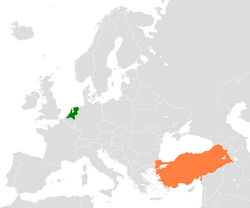Dutch-Turkish relations

|
|
|
|
|
| Kingdom of the Netherlands | Turkey |
The Dutch-Turkish relations describe the bilateral relationship between Turkey and the Kingdom of the Netherlands . Both countries are members of the Council of Europe and NATO , and the Netherlands is a member of the European Union , to which Turkey is a candidate country. In 2013, the Netherlands agreed to Turkey's accession talks. The Netherlands has an embassy in the Turkish capital Ankara and a consulate general in Istanbul , Turkey has an embassy in The Hague and two consulates general in Deventer and Rotterdam .
Since the dispute over election campaign appearances by Turkish politicians in the Netherlands in March 2017, the relationship between the two countries has been considered to be heavily strained.
Celebration on the occasion of 400 years of bilateral relations
- See also Cornelius Haga , the first diplomatic representative of the Netherlands in Constantinople from 1612 to 1639.

In 2012, the 400th anniversary of friendship between Turkey and the Netherlands was celebrated. To celebrate this occasion, cultural-historical events were organized in both countries. The plans were drawn up during the reign of the Balkenende cabinet and continued by the cabinet under the direction of Mark Rutte . When Ministerie van Buitenlandse Zaken (State Department) a representative with the task of coordinating the activities entrusted. Former Minister Ben Bot said during the celebrations: “Turkey is one of the few countries with which the connection has never been broken, not even during the wars or under other dire circumstances. This is very extraordinary. "
The celebrations began in April 2012 with the opening of the Turkish pavilion at the Floriade 2012 in Venlo by Turkish President Abdullah Gül , whose name means “ rose ” in Turkish . Most of the activities took place between March and November 2012. The state visit of the Turkish President in the Netherlands took place from April 17th to 19th, 2012, which was accompanied by the protests of Geert Wilders against the visit of Gül. From June 13 to 15, 2012, Queen Beatrix's official return visit to Turkey took place.
Dispute over election campaign appearances in 2017
At the beginning of March 2017, the Dutch Prime Minister Mark Rutte declared an election campaign for a yes to the presidential system in the referendum in Turkey in 2017 by the Turkish Foreign Minister Mevlüt Çavuşoğlu as undesirable in the Netherlands. As a result, Turkey threatened the Netherlands with economic sanctions if the election campaign events were canceled, whereupon the Dutch government Çavuşoğlu, who wanted to arrive despite the Dutch government's cancellation, refused to land by plane on March 11, 2017. The Turkish Family Minister Fatma Betül Sayan Kaya also wanted to give a speech at the consulate in Rotterdam , but was prevented from doing so by the Dutch police and declared a persona non grata , whereupon she flew back to Turkey.
As a result of these events, around 2,000 people protested in Rotterdam, and later violent clashes broke out between the Turkish demonstrators and the police, in which several people were injured. There were also riots during protests in Amsterdam , and six people were arrested.
Turkish President Recep Tayyip Erdogan described the Netherlands so on the same day as "Nazi descendants" and "fascists" after he and a few days before Germany as a result of cancellation of a Turkish campaign appearance in Germany methods from the time of National Socialism had accused. The Dutch government rejected the criticism as "inappropriate" and emphasized that no talks could take place on this basis. Holocaust survivors in the International Auschwitz Committee also criticized Erdoğan's remarks, which they described as "absurd Nazi comparisons". The Turkish European Minister accused the Netherlands of “neo-fascist practices” on March 13th, and at the same time the Dutch ambassador to Turkey was summoned for the cancellation of campaign appearances and the use of police against Turkish demonstrators.
With reference to their history during the Second World War, the Netherlands demanded an official apology from the Turkish government and were supported by the German Chancellor Angela Merkel and the French Foreign Minister Jean-Marc Ayrault . Conversely, Turkey is also demanding an apology from the Netherlands. With reference to the diplomatic tensions between the two countries, the Netherlands issued a new travel warning for Turkey on March 13, but the Foreign Ministry did not generally advise against a trip to Turkey.
See also
Web links
Individual evidence
- ↑ EU states force accession talks with Ankara. In: spiegel.de. October 21, 2013, accessed March 12, 2017 .
- ↑ Dutch embassies in Turkey , accessed on March 12, 2017
- ^ Turkish embassies in the Netherlands , accessed on March 12, 2017
- ↑ Oud-ambassadeur Ben Bot over 400 years diplomatieke betrekkingen Nederland-Turkije . In: RD.nl . ( rd.nl [accessed on March 14, 2017]).
- ↑ Beatrix naar Turkije na tumultueus staatsbezoek president Gül in april . In: nrc.nl . ( nrc.nl [accessed March 14, 2017]).
- ↑ Beatrix naar Turkije na tumultueus staatsbezoek president Gül in april . In: nrc.nl . ( nrc.nl [accessed March 14, 2017]).
- ↑ The Netherlands declare Turkish election campaign “undesirable”. In: welt.de. March 4, 2017. Retrieved March 12, 2017 .
- ↑ Erdoğan threatens consequences. In: zeit.de. March 12, 2017. Retrieved March 12, 2017 .
- ↑ a b Netherlands tighten travel warning for travelers to Turkey. In: zeit.de. March 13, 2017. Retrieved March 13, 2017 .
- ↑ Police stop the Turkish minister's vehicle. In: tagesspiegel.de. March 11, 2017. Retrieved March 12, 2017 .